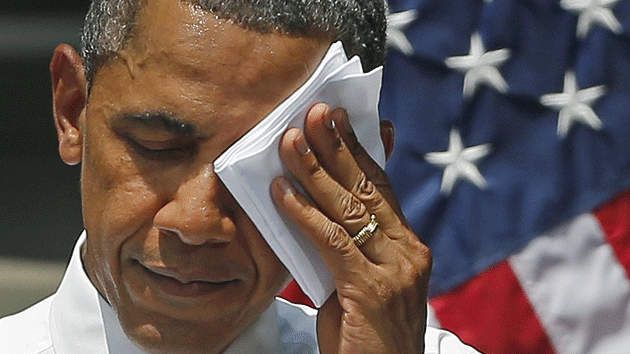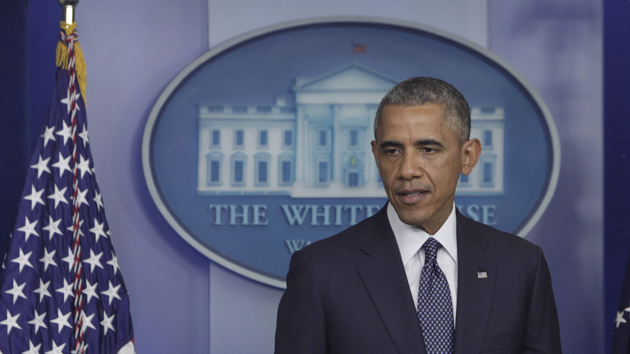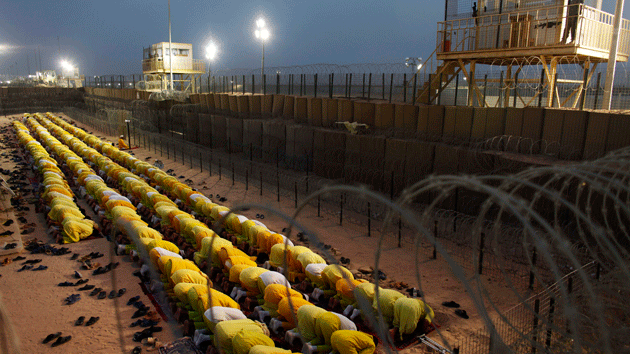
Charles Dharapak/AP
Being president can be a bitch.
Barack Obama is in charge of the world’s most consequential superpower (when you combine economic might and military force) at a time when the world seems to be cracking up more than usual. A Malaysian airliner is shot down—presumably by Russian-armed separatists in Ukraine. The too-extreme-for-Al-Qaeda Islamic State, a Sunni force once allied with Washington-backed Syrian rebels fighting the Russian-supported Assad regime, has taken control of a swath of territory in Syria and Iraq and set up an Islamic fundamentalist state that is waging war against the Shiite-dominated government of Iraq, which is supported by Russia-allied Iran and Washington. Meanwhile, US-backed Israel has sent military forces into Gaza to quash Hamas, a Sunni-dominated outfit that receives support from Shiite Iran (a US foe) and Sunni Saudi Arabia (a US ally). And at the same time, the United States—as part of the P5+1, which includes Russia, China, England, France, and Germany (a key trading partner of Iran and a US ally that is pissed off at Washington for spying on it)—is trying to arrange the extension of nuclear talks with Iran, as the negotiations hit the deadline. Obviously, the United States needs Russia—which Obama just hit with tougher sanctions (before Malaysian Airlines Flight MH17 was blasted out of the sky)—to lean on Iran for these talks to succeed.
And there’s a humanitarian crisis ongoing at the US-Mexico border.
None of these matters are easily resolved—and many are interlinked. Should Obama declare a new Cold War against Russia? That could impede reaching a deal with Iran. As he supports the Israeli military action in Gaza—while decrying civilian casualties caused by Israeli strikes—he further bolsters the United States’ association with Tel Aviv, which arguably undermines US credibility, standing, and influence in an increasingly troubled region. Does he provide the authoritarian and inept regime in Iraq with military assistance that could end up in the hands of Iranian fighters supporting Baghdad—and further strengthen Iranian influence in Iraq, which freaks out Saudi Arabia?
This is a time of dilemmas and, yes, hard choices. A variety of polls in the past year have clearly showed the American public is not keen on US military intervention in Syria, Ukraine, or Iraq. Yet, no doubt, Americans look to the president with a very powerful yearning: fix it. That is, make the chaos go away and protect us.
Yet there are no simple fixes for these nuance-drenched problems. So as Obama considers lousy options and tries to thread multiple needles at once, he becomes vulnerable to political attack. GOP hawks call for immediate action: arm the rebels in Syria, launch air strikes in Iraq, send weapons to Ukraine. And if Obama doesn’t heed their demands, they pronounce him weak and ineffective—feckless. And here comes Dick Cheney again to denounce the president as a threat to US national security. On the day Flight MH17 was attacked, Sen. John McCain (R-Ariz.) went on Fox News and claimed Obama was “cowardly” for not having dumped arms into Ukraine. That same day, Fox News correspondent Ed Henry echoed a developing conservative meme when he asked White House press secretary Joshua Earnest if Obama is a “bystander” president.
The public, if polls are to be believed, tend not to support the demands of the hawks and neocons. But the incessant charge that Obama is indecisive and weak does become part of the never-ending background noise of American politics. When Obama did not launch a military strike against Syria last year—and instead compelled Russia to help broker a deal that led to the removal of Syria’s chemical weapons—his approval ratings dropped, as GOPers relentlessly assailed him for talking tough but not pulling the trigger. (The Republicans, though, were not eager to take a vote on US military action against the Assad regime, realizing the public was not likely to support another US war in the Middle East.) Obama gained a small policy win with that episode—the deal seems to have worked—but the Republicans found that it was easy to cast him as an ineffective commander-in-chief without having to take a tough stand on what to do.
The GOP has learned that noise counts. While the public is looking to Obama, perhaps unfairly, to resolve messes that may not be neatly resolvable, and Obama moves deliberatively and cautiously to deal with explosive situations that cannot be readily defused or set aside, his political foes can and will continue to slam him for being indecisive and naive, and they will score points. Their political goal is no surprise: keep Obama’s approval ratings down and hamper his effectiveness as a campaigner for Democrats as the mid-term elections approach. For years, they have tried to use the traditional GOP attack on Democrats: he’s weak on national security. That was tough for them, given the successful Osama bin Laden raid, the Libyan action, and Obama’s surge in Afghanistan. And the public’s post-Bush/Cheney war weariness did not create a conducive environment for this classic Republican assault. Yet with international troubles on the rise, the Rs are now able to exploit a public desire for Obama to make all this stuff stop.
Given the complexities of the assorted crises under way, there are probably few bold strokes available for Obama that will do more good than harm. So the opportunity to come across as a forceful and muscular statesman is limited. Muddling through in some of these instances could be the best alternative. But that certainly is hard to sell politically.
Obama and his advisers entered the White House in 2009 believing that good policy makes for good politics. That’s often the case, but not always. Their policy wins on the stimulus, the auto industry bailout, and health care reform did not yield a better political landscape for the president and his Democratic allies. The no-good-answers national security policy issues of the moment pose even tougher challenges—as Republicans are poised to exploit the problems overseas for maximum political gain at home.













